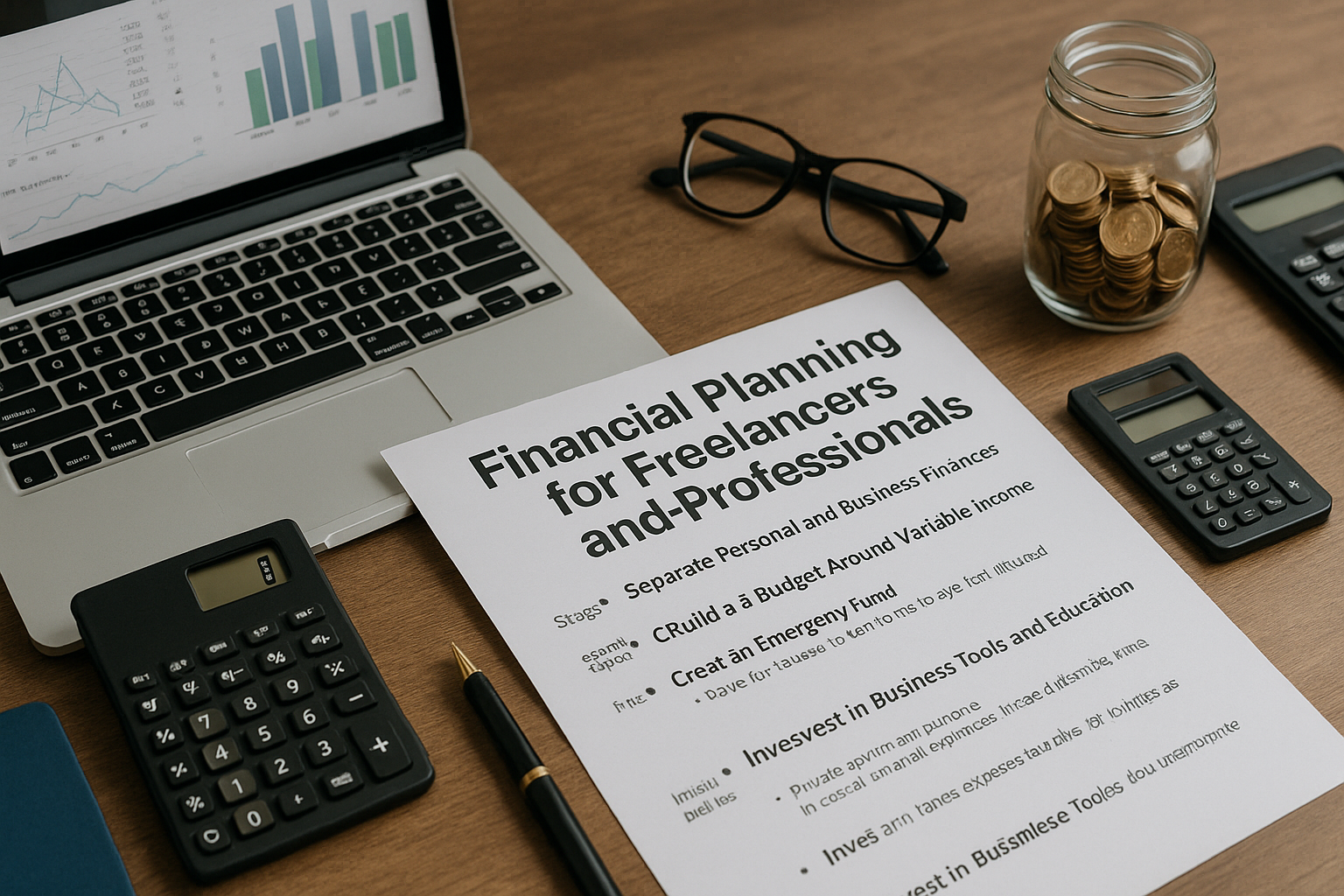Financial Planning for Freelancers and Self-Employed Professionals
Freelancers and self-employed individuals often enjoy flexibility, independence, and the opportunity to pursue passions on their own terms. But with that freedom comes a unique set of financial challenges. Without the safety net of a steady paycheck, benefits, or employer-managed retirement plans, solid financial planning becomes even more crucial.
This article will help you understand how to manage your finances as a freelancer—from budgeting and saving to taxes and retirement planning—so you can thrive both personally and professionally.
Why Financial Planning Is Crucial for Freelancers
Unlike traditional employees, freelancers must manage:
- Irregular income
- Self-paid taxes
- Business expenses
- Lack of employer-provided insurance and retirement benefits
Without a proper plan, it’s easy to fall into debt, miss tax payments, or fail to save for the future. The key is to treat your freelance work not just as a job—but as a business.
Step 1: Separate Personal and Business Finances
The first step to financial clarity is opening a separate business bank account. This makes it easier to:
- Track income and expenses
- Simplify tax preparation
- Avoid mixing personal and professional spending
Even if you’re a sole proprietor, keeping accounts separate builds discipline and prepares you for potential growth or formal business registration in the future.
Step 2: Build a Budget Around Variable Income
A standard monthly budget doesn’t work well when your income fluctuates. Instead, use an average-income budgeting strategy:
- Track your income for 6–12 months.
- Calculate your average monthly income.
- Build a budget using that average as your baseline.
Make sure to prioritize fixed and essential expenses like rent, utilities, groceries, and insurance. Use the high-income months to save and prepare for slower periods.
Pro Tip: Budget in tiers
- Essential expenses: Rent, food, bills
- Important extras: Software tools, marketing, education
- Discretionary spending: Travel, dining, entertainment
Adjust each tier based on your income each month.
Step 3: Create an Emergency Fund
An emergency fund is non-negotiable for freelancers. With unpredictable income, having a cushion is crucial to cover dry months or sudden expenses.
Emergency fund goals:
- Start with $1,000
- Build toward 3–6 months of average expenses
- Store it in a high-yield savings account, separate from daily spending
Treat it as sacred—only to be used in true emergencies like illness, equipment failure, or income gaps.
Step 4: Save for Taxes Year-Round
Freelancers are responsible for paying their own taxes, including income tax and sometimes self-employment or social security contributions.
Here’s how to avoid a tax-time crisis:
- Set aside 20% to 30% of each payment into a dedicated tax savings account
- Keep detailed records of income and deductible expenses
- Consider working with an accountant or tax advisor
Also, be aware of quarterly tax payment deadlines in your country to avoid penalties.
Step 5: Invest in Business Tools and Education
Freelancers are their own bosses, so investing in your growth is vital. Allocate part of your budget to:
- Courses and certifications
- Productivity tools (e.g., project management apps, cloud storage)
- Equipment upgrades (e.g., laptops, software, camera gear)
- Marketing and client acquisition tools
These are not just expenses—they’re investments in the long-term sustainability of your career.
Step 6: Plan for Retirement
Many freelancers neglect retirement planning because there’s no employer forcing the issue. But the earlier you start, the better your chances of achieving financial independence.
Retirement savings options:
- IRA or Roth IRA (U.S.): Good for individual savers
- Solo 401(k): Higher contribution limits for self-employed
- Private retirement funds or pension plans (available in many countries)
Automate your retirement contributions just like a traditional employee would. Even small monthly amounts compound significantly over time.
Step 7: Get Health and Income Protection
Without employer-sponsored health insurance or paid leave, freelancers must protect themselves.
Options include:
- Private health insurance: Compare coverage and prices
- Disability insurance: To protect your income in case of illness or injury
- Liability insurance: Especially for consultants or service providers
- Life insurance: If you have dependents or long-term obligations
These may seem expensive, but they are critical safeguards for your livelihood.
Step 8: Diversify Your Income Streams
Relying on one or two clients is risky. Losing them could impact your entire financial stability.
Explore ways to diversify:
- Offer different types of services
- Build digital products or courses
- Start a blog or YouTube channel with affiliate income
- Accept short-term contracts or side gigs
Multiple income streams help smooth out financial ups and downs.
Step 9: Track and Analyze Your Finances Regularly
Schedule a “money day” once a week or month to:
- Review income and expenses
- Reconcile invoices and payments
- Analyze profit and loss
- Plan for upcoming expenses or business opportunities
Use tools like QuickBooks, FreshBooks, or even Google Sheets to make this easy and automated.
Step 10: Set Financial Goals and Review Them Often
Freelancers often overlook long-term planning. Set specific financial goals such as:
- Saving for a house or car
- Reaching $100k in annual income
- Paying off debt
- Taking 2 months off each year while still earning
Break these into smaller milestones and track your progress. Celebrating small wins keeps motivation high.
Final Thoughts: Freelancers Thrive on Strategy
Financial freedom as a freelancer doesn’t come from luck—it comes from strategy. While it’s tempting to focus solely on the creative or service aspect of your business, you also need to be the CEO of your finances.
With consistent planning, saving, and learning, you can build a thriving freelance career that’s both profitable and sustainable.
Remember: treat your freelance income like a business—and your future self will thank you.

